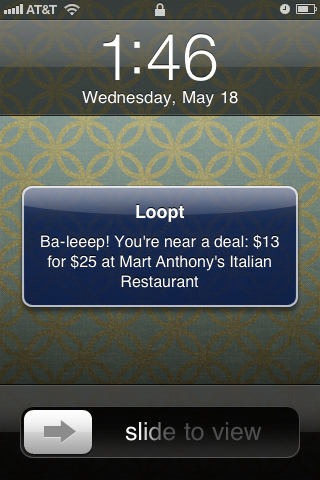Most of you are probably familiar with Living Social, they offer a new deal each day to their members. Well today they’ve put out the largest national fast food daily deal – ever. The deal is a $13 voucher booklet, redeemable for five individual Big Macs and five individual large french fries. Snagging this deal will net you a savings of 50%.
According to Teter Sterling, Vice President of Marketing for McDonald’s, “Both LivingSocial members and McDonald’s customers are looking for delicious food at a great value, and this deal hits the sweet spot for both personal purchases and holiday gifts.”
Best. Burger. Ever…Big Mac. Best. Deal. Ever…@LivingSocial. C http://t.co/s0BioD7C 4 info
At the time of this writing 67,557 of the voucher booklets had been sold. If you do the math, thats 337,785 Big Macs. That’s a lot of special sauce McDonald’s will be slinging around this holiday season.
A little FYI: each Big Mac contains 580 calories, couple that with large fries, you’re looking at 1,150 calories.
As I’m sure you can imagine, McDonald’s began receiving flak on Twitter questioning their quality of meat… you know, the usually. It got so bad that McDonald’s tweeted out the following, in attempt to stop some of the negativity:
FYI – All of McDonald’s
hamburgers are made with 100-percent USDA-inspected beef.
It should be noted that purchasers of the deal will receive individual vouchers for each item, not one big voucher. So you won’t have to order the 5 Big macs & 5 large fries at one time… though we’re sure some of you will, I can see a Tumblr account coming out of this.
With news of the McDonald’s Living Social deal, people took to Twitter to vent their feelings on it. You can check out some of them below:
Welcome to DyingSocial! RT @jamestweeting Today’s Living Social deal: 5 Big Macs & 5 Large Fries. Five. FIVE.
Tomorrow’s Living Social: Angioplasties, 2 for 1. http://t.co/LPctPutK
Way to go living social for adding to the obesity problem by featuring this deal: 5 big macs & 5 large fries for $13 http://t.co/13hT0dDT
Today’s Living Social deal: an even cheaper heart attack http://t.co/9awXu4sY
Living social FAIL: $26 of big macs and French fries from McDonald’s. One hour 470 sold. #obesityepidemic #fail via @yuntraining
I really have to unsubscribe from all this Groupon/Living Social/Generic Deals stuff. Today they’re trying to sell me $26 of Big Macs.
Oh, “LivingFat?” is more like it. RT @sugarpopnyc: Today’s living social deal is 5 big macs + 5 large fries. Pathetic.
This Living Social deal for McDonald’s is just plain ole fat..Gluttony at its finest… yuck
Congress and Living Social should team up to make the Big Mac a vegetable. http://t.co/KVlB4KmQ #
Man, @LivingSocial‘s deals have gone waaaaay downhill when they’re hawking Big Macs from @McDonalds. http://t.co/AnT33ZeB
So how many are you voucher booklets are you picking up? Tell us in the comment area below.



















 “Let’s take a closer look at deliverability,” she continues. “Reaching the inbox is essential for daily deal providers. Each undeliverable email means a lost sales opportunity. You need to do everything in your power to ensure that deal emails get through.”
“Let’s take a closer look at deliverability,” she continues. “Reaching the inbox is essential for daily deal providers. Each undeliverable email means a lost sales opportunity. You need to do everything in your power to ensure that deal emails get through.”













